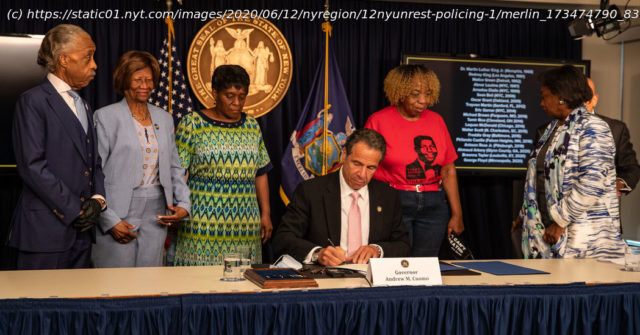The state became the first to make major changes in police practices in the wake of George Floyd’s killing, which has spurred nationwide protests.
New York on Friday became the first state to take meaningful action to rein in police forces after the killing of George Floyd, banning the use of chokeholds by law enforcement and repealing a half-century-old law that has kept police disciplinary records secret in the state.
Gov. Andrew M. Cuomo signed the expansive package of bills less than three weeks after Mr. Floyd’s death at the hands of the police in Minneapolis, which has since sparked widespread civil unrest and demonstrations against police brutality and racism.
New York City also took tentative steps toward meeting protesters’ calls to “defund the police.” On Friday, the City Council speaker, Corey Johnson, said the Council had identified $1 billion in cuts to the Police Department’s $6 billion budget, and would urge Mayor Bill de Blasio to agree in advance of the July 1 budget deadline.
Mr. de Blasio quickly rejected the proposal, while indicating that he was open to further negotiations over the size of the Police Department. “The mayor has said we’re committed to reprioritizing funding and looking for savings, but he does not believe a $1 billion cut is the way to maintain safety,” said Freddi Goldstein, Mr. de Blasio’s press secretary.
A similar reckoning is occurring across the nation, as lawmakers are weighing various changes to police tactics that may have exacerbated racial disparities in law enforcement. In California, Gov. Gavin Newsom called for an immediate end to the use of “strangleholds” last week, saying such use of force had “no place any longer in 21st century practices and policing.”
In Washington, where authorities used tear gas and rubber bullets to clear peaceful protesters from Lafayette Park for President Trump to stage a photo op at St. John’s Church, the District of Columbia’s Council unanimously passed a sweeping series of changes earlier this week, including prohibiting the use of chemical irritants, riot gear and stun grenades on demonstrators exercising their First Amendment rights.
And in Minneapolis, where Mr. Floyd was killed on May 25, the City Council voted on Friday to seek “a transformative new model for cultivating safety in our city” just days after vowing to dismantle the city’s police department. But even there, change would take time — months if not more, and not before a citywide vote and rounds of bureaucratic wrangling.
The obstacles to the kind of sweeping and immediate changes made in New York could also be seen in Minnesota’s State Capitol, where an ambitious package of police reforms proposed by Democrats faced an uncertain future.
Republicans who control one legislative chamber said they would oppose some of the most far-reaching changes, including restoring voting rights to felons or putting the state’s attorney general, rather than local prosecutors, in charge of investigating killings by the police.
The clash over how much change lawmakers are willing to accept in a state that has become ground zero of a new movement to address racism and police brutality shows how difficult it may be to bring real changes across a patchwork of state governments and in a divided Washington.
“For years, policing has been a neglected corner of government when it comes to legislative activity,” said Barry Friedman, the director of the Policing Project at New York University School of Law.
Home
United States
USA — Criminal N. Y. Bans Chokeholds and Approves Other Measures to Rein In Police






